A Life in a Passport
- By Guest blogger
- 5 December, 2015
- 2 Comments
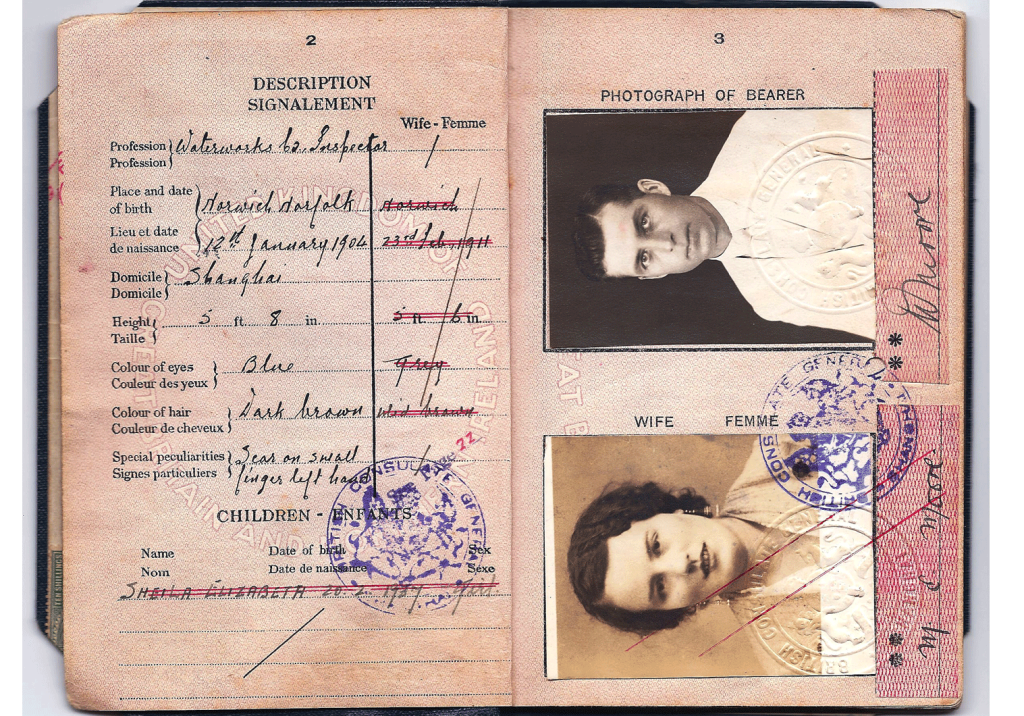 This article by Neil Kaplan about an unusual British passport was first published on his website Our Passports. It is reproduced here with his kind permission.
This article by Neil Kaplan about an unusual British passport was first published on his website Our Passports. It is reproduced here with his kind permission.
Sometimes fate shines upon us collectors and allows us to put our hands on rare and extraordinary pieces. Once in a while we are lucky enough to find and place into our collections those rare and unique items that we can only wish for. The article today will enclose images of a travel document that I was able to acquire from another fellow collector, via an exchange of items, several months ago.
What makes this passport extra special and important is the mixture of visas that are located inside one single document. The item has visas that enabled the holder to travel throughout occupied China, Japan, Manchuria, Siberia, Poland and Nazi Germany on his journey back home to the UK.
British passport number 10101 was issued at Shanghai on August 2nd 1933 to William Moore who was born on January 12th 1904 at Norwich. He joined the army at the young age of 15 in 1919 and served until 1929, with his last post in China (serving at home he also was posted to Jamaica and Egypt). We can presume that he fell in love with the Far East and stayed in Shanghai. It is in that city that he got married to Mildred Eva Brock in 1935, with their daughter Sheila Elizabeth being born in 1937 and added into the passport as well.
William More was working at the Shanghai Waterworks as an inspector. It was also his war-time job during the occupation of the city by the Japanese.
In 1939, before the war broke out in Europe, the Moore’s returned back to the United Kingdom for a brief visit. The task of obtaining the correct visas was taking place at Shanghai: page 12 has a transit visa (number 10) from the Manchurian Trade Commission which was issued and hand singed by the senior Manchurian representative to the city Mr. Wang Qingzhang, a Chinese native.
Born on June 12th 1894, Wang graduated from the Tokyo Technical High school in 1917, majoring in chemistry, then returning back to China in 1921; he held several posts in the coming years, for example: translator while being posted at the army HQ in Harbin and more. After the Mukden incident, he held different posts within the Manchurian government: Worked in the offices of Ministry of Civil affairs, appointed mayor to the city of Mukden (1935), Ministry of Construction Industry (1937) and a member of the European economic diplomatic corps. He arrived in Shanghai as trade commissioner in early 1939, and this could explain why the relatively low numbered visa (10) is actually hand signed personally by him on April 18th of that year and not rubber-stamped as in later issued visas. Later posts were Postmaster General to Manchuria in 1942 and Manchuria’s highest representative in the Philippines in 1944.
The following visa on the next page was issued at the German consulate by Consular secretary Werner Meyer, who served in Shanghai between December 1937 and August 1943. The next interesting visa we can find on page 15, issued at the Polish consulate in the city by diplomat Andrzej Bohomolec. He was stationed in Shanghai only for that year; here are some points about this diplomat:
- November 22nd 1900 at Rozentowie –December 12th 1988 at Edmonton;
- Fought in the Polish-Russian war of 1918-1920;
- 1933-134 was the first Pole to cross the Atlantic with a yacht;
- 1936-1939 Served at the Polish Foreign Ministry;
- 1939 – Charge d`Affaires in Shanghai;
- 1940 joined the Polish army in France; evacuated to the UK after the fall of Paris;
- Fought in north Africa and Italy during the war;
- Settled in Canada later on;
Before departing Shanghai, Mr. Moore obtained the Japanese transit visa at the Japanese consulate on April 17th (issued to him by Consul General Miura Yoshiaki (三浦義秋)) which enabled him to arrive at Dalian on May 12th. He also received the Soviet transit visa as well at the Soviet consulate. He entered the USSR on May 15th, via the Manchurian-Soviet border crossing at Manzhouli (满洲里); then exited on the 22nd into Poland at the joint border-crossing of Stołpce, entering into Germany at Zbąszyń the following day. He entered Holland on the 24th and from there he went to the UK.
The Moore’s returned to China at the end of 1939 via Canada and Japan. The family was separated around 1942, following the Japanese invasion and occupation of Shanghai. Mildred and Eva went into the Lungwa civilian internment camp from April 5th 1943 to August 22nd 1945 (inmates numbers 20/392 & 20/393); were as William was interned at two separate camps, first in Shanghai Haiphong camp on November 5th 1942 and then moved to the Beijing Fengtai camp, released August 19th 1945 (he was able to maintain, apparently, his work at the Shanghai Waterworks up to his transfer to Beijing).
During the internment period in China, William’s passport was extended or registered at the Swiss consulates in both Shanghai and Beijing: As was the case in occupied Europe, the neutral countries were permitted to continue running their legations and consulates in occupied China as well. As in Europe, they assumed the position of taking care of the interests of those who were now unable to benefit from the protection of their country’s consulates. These consulates and legations now added another department: The section for protection of foreign interests. In China we can find the Swiss consulates, in both Beijing and Shanghai, which took care of these interests:
“Swiss Consulate General – Section for Protection of American Interests – Shanghai”
“Representative of the Swiss Consul General – In Charge of British Interests – Beijing”
” Swiss Consulate General – Section for Protection of British Interests – Shanghai”.
The passport has the endorsement & personal hand signatures of those who were assigned to offer such protection in both Shanghai and Beijing during the years 1943, 1944 & 1945.
The Swiss diplomat in Shanghai (based at the Messageries Maritimes Building) was named Dr. Wilhelm Schilling, and here is some biographical information about him:
- Born in 1902 in British India, Madras, he obtained his university degree at Zurich. His career at the Swiss Foreign Service started in 1935, the year he joined. His posting was to Shanghai, for a period of 9 years (1937-1946). His further postings took him to Berne, Washington, Chicago at the US and again returning back to Berne. He is also credited for participating in the founding of the Swiss Chamber of Commerce in Shanghai. He retired in 1960. He was highly respected and admired by the Allies for his countless efforts and work.
The other individual who signed this passport was also a Swiss diplomat, based in Beijing, named Dr. Reinhard Hoeppli:
- Born in 1893 in Wiesbaden, Germany, he was a physician who specialized in parasitology with a position of a professor at the university. He started to assist the foreigners after he joined the Department of foreign Affairs in 1942 as a representative of the Consulate General of Switzerland in charge of foreign interests (from the period of 1942 to 1946). His work did not end there after the war, with a continuation of his posting in China, Beijing, from 1948 to 1952 as cultural affairs attaché.
(The biographical information on Wilhelm Schilling and Reinhard Hoeppli was provided by the History Unit of the Federal Department of foreign Affairs of Switzerland.)
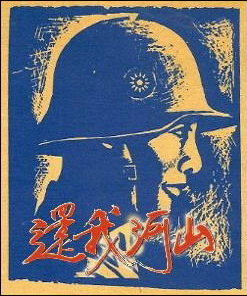
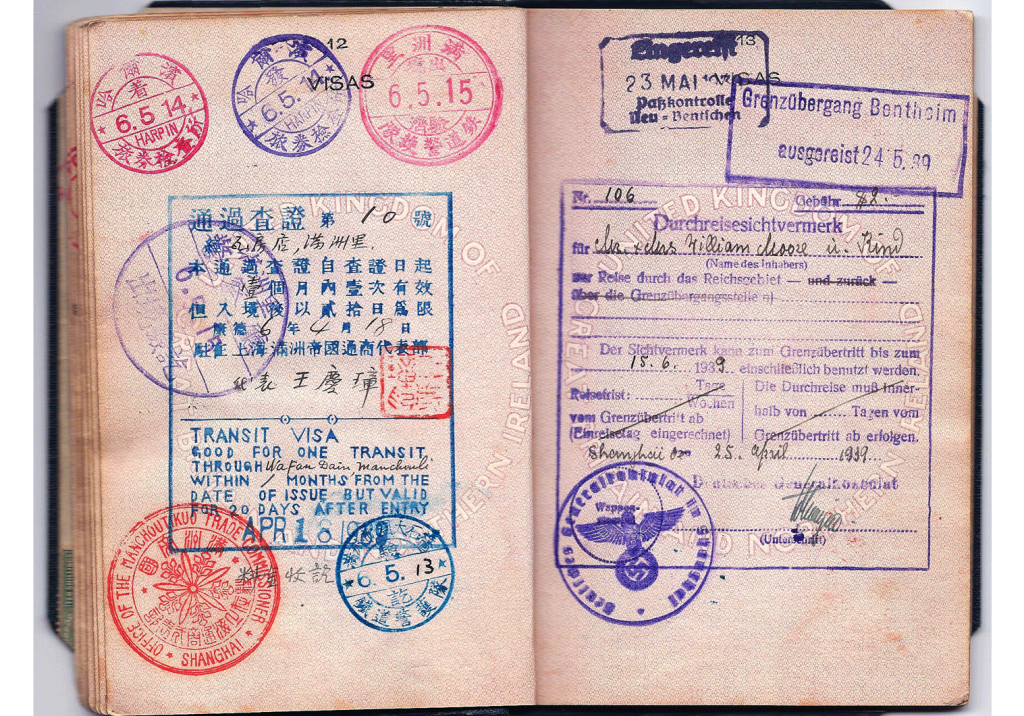
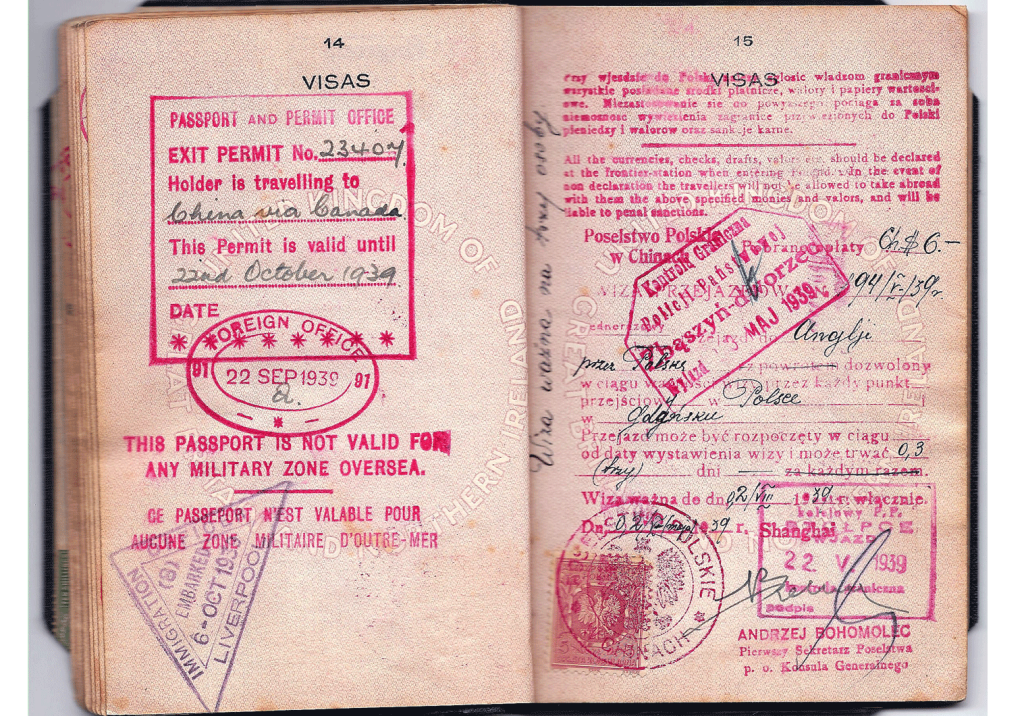
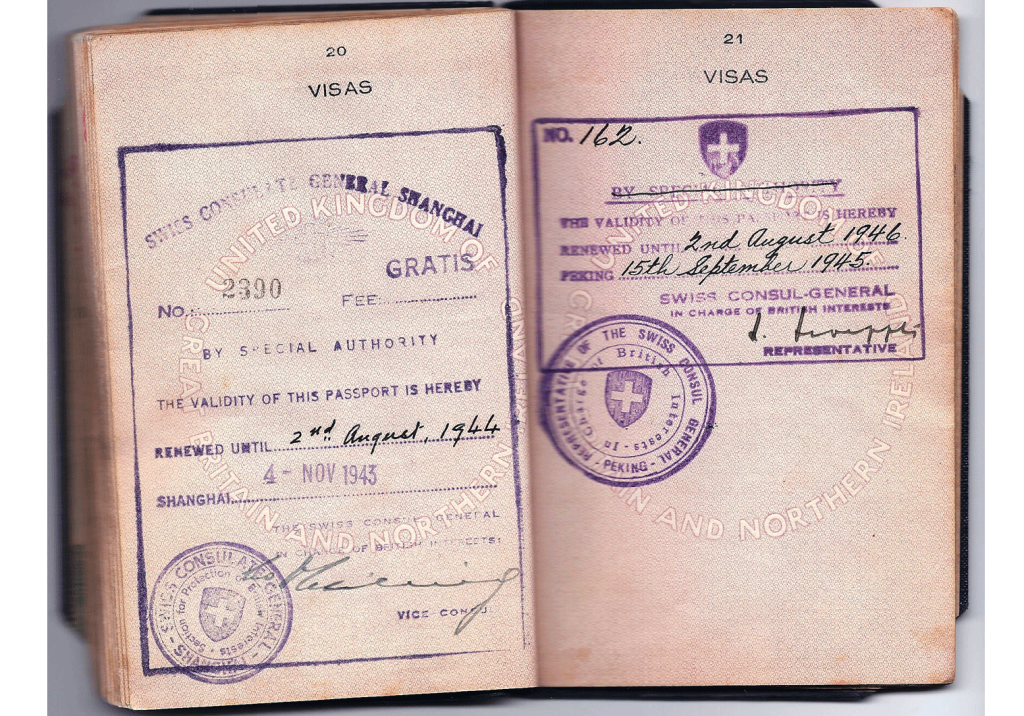
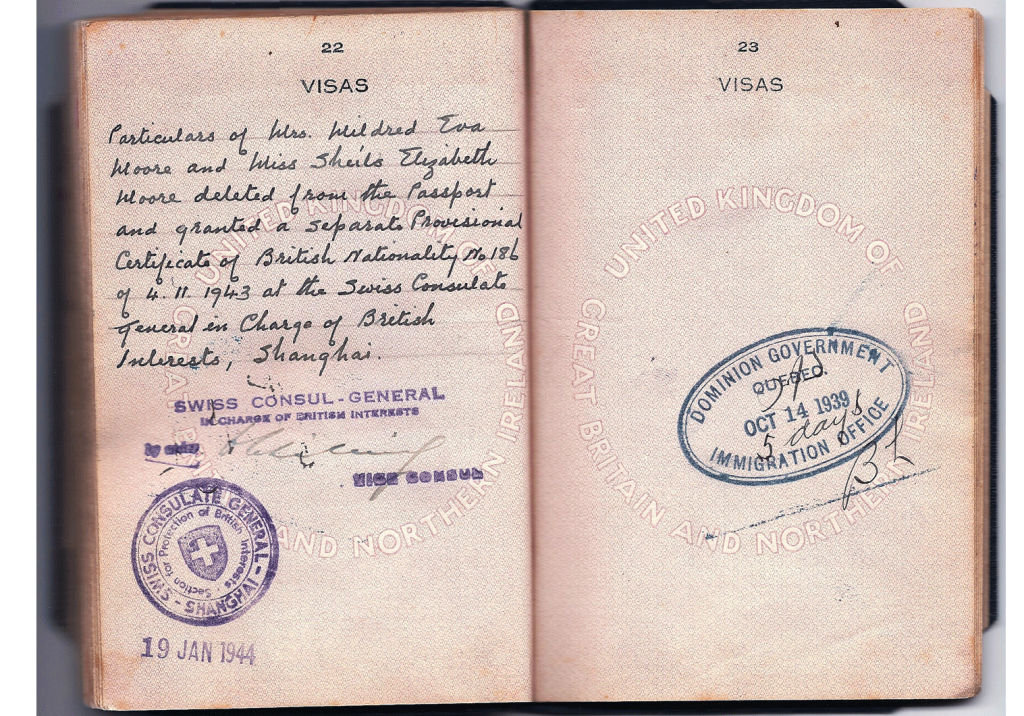


 Copyright © 2025
Copyright © 2025
A VERY interesting article !!!
Its amazing how much we are able to learn about someone from his personal documents !
The article states “page 12 has a transit visa (number 10) from the Manchurian Trade Commission which was issued and hand singed [sic] by the senior Manchurian representative to the city Mr. Wang Qingzhang, a Chinese native.” The stamp reads “Office of the Manchoutkuo Trade Commission” [insertion of ‘t’ noted] which indicates that the puppet state of Manchukuo had offices outside itw own territory. One never thinks of the Manchukuo bureaucracy extending beyond the geographical limits of that Japanese creation. Since Mr. Wang Qingzhang, a Chinese, represented that office in Shanghai, one assumes that he simply faded away when the war and Manchukuo ended.